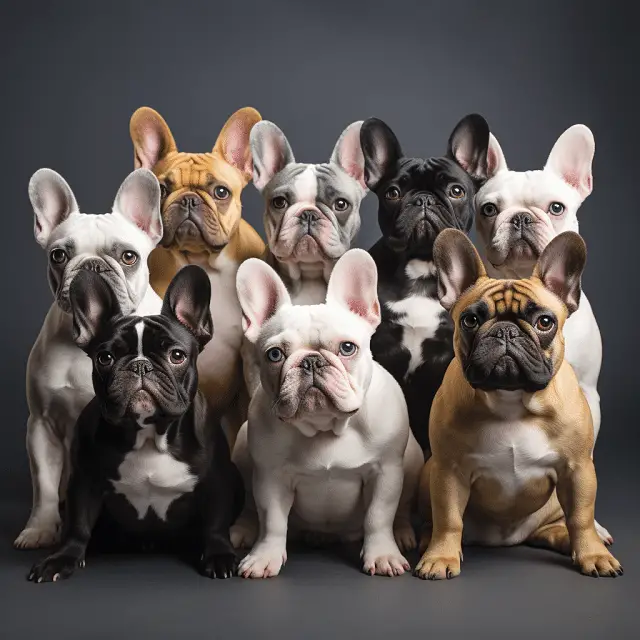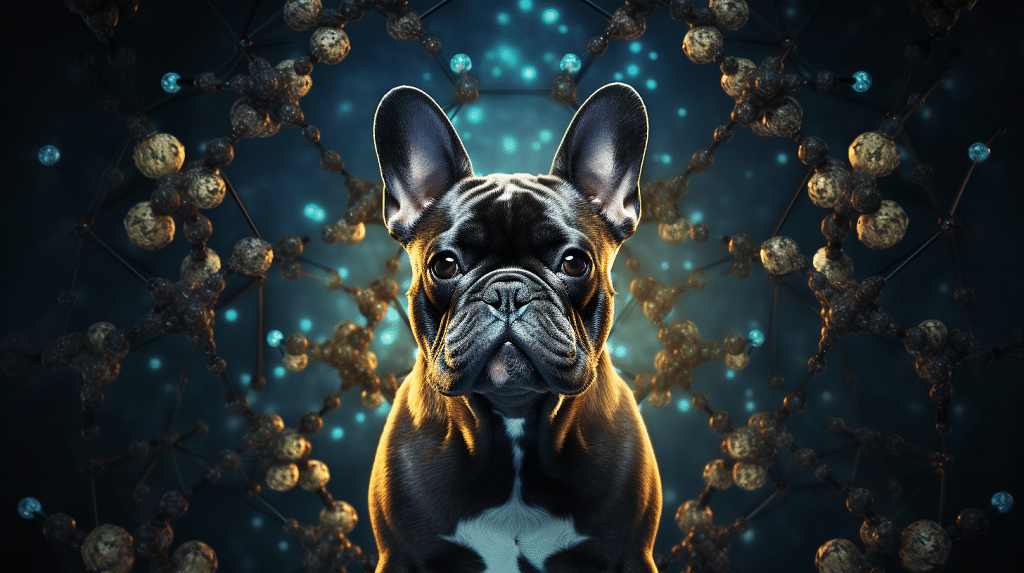Is My French Bulldog Purebred?: Ever wondered if your French Bulldog is purebred? You’re not alone. Millions of pet parents ponder the same question. Knowing your dog’s pedigree isn’t just about bragging rights, it’s vital for understanding their health and behavior too. This article will guide you through key characteristics, genetic traits, and physical features to look out for in a purebred French Bulldog. Let’s unravel the mysteries of your furry friend’s lineage together!
Understanding the Characteristics of a Purebred French Bulldog
You’re probably wondering how to tell if your French Bulldog is purebred, aren’t you? There are several ways to do this, and it involves understanding the characteristics of a purebred French Bulldog.
One of the most important things to consider is dog registration. A purebred French Bulldog should be registered with a recognized kennel club like the American Kennel Club (AKC) or the United Kennel Club (UKC). This registration verifies that your pet’s lineage consists only of dogs from the same breed.
Physical appearance based on breed standards is another way to verify your bulldog’s purity. Purebred French Bulldogs have distinctive characteristics such as bat ears, short nose, heavy bone structure and smooth coat. They typically weigh between 16-28 lbs and stand about 11-12 inches tall at the shoulder. Any significant deviation from these standards might indicate that your dog isn’t a purebred.
Genetic testing can provide more definitive proof of your bulldog’s ancestry. These tests analyze DNA samples from your pet to determine its genetic makeup. If there are genes present that don’t belong in a French Bulldog’s genome, then it’s likely not purebred.
Finally, seek professional advice if you’re still uncertain about your dog’s pedigree status. Veterinarians or certified canine geneticists can offer valuable insights based on their expertise in canine genetics and breed identification.
Remember though, whether or not your pup is purebred doesn’t diminish its worth as a member of your family. It just provides you with some interesting information about their heritage!

The Importance of Dog Registration Papers
It’s vital to obtain registration papers when purchasing a new pup, as they’re essential for proving your dog’s pedigree. These documents are the key to verifying ancestry and determining breed purity of your French Bulldog.
The significance of registration lies in its ability to provide an official record of your dog’s lineage. This verification process is crucial in confirming that your Frenchie adheres to the established breed standards.
Here are three main reasons why:
- Preservation of Breed Standards: Registration papers ensure that breeders maintain the integrity and health of the breed by only breeding dogs that meet specific physical and genetic traits.
- Verifying Ancestry: The pedigree certificate provides a detailed family tree, tracing back several generations. This allows you to ascertain if there has been any cross-breeding in your dog’s lineage.
- Determining Breed Purity: By evaluating physical appearance and genetics, these documents help establish whether or not your Frenchie is purebred.
Understanding canine genetics can be complex, but it plays a significant role in preserving the unique characteristics inherent in each breed. For instance, certain genes control coat coloration, ear shape, size and even predisposition towards specific illnesses.
Registration papers truly serve more than just proof ownership; they’re valuable tools for maintaining breed standards and promoting responsible breeding practices. Now you know why it’s so important to get those registration papers when you bring home a new French Bulldog pup!
Decoding the Genetic Makeup of a French Bulldog
Decoding your pup’s genetic makeup can shed light on their potential health risks and unique traits. Genetic testing, a process that analyses DNA sequences, gives you an in-depth look at the specific breed identification of your French Bulldog. This advanced technique identifies genetic markers or variations in your dog’s DNA that are associated with different breeds.
In the case of a purebred French Bulldog, the genetic markers will likely point to a clear lineage without any mixed breed possibilities. These markers also hold keys to understanding potential health issues that are common within this breed, such as hip dysplasia or brachycephalic syndrome.
Modern technology now allows for at-home DNA analysis kits that can simplify this process for you. It’s as straightforward as swabbing your dog’s cheek and sending it off to the lab where they’ll decode the information embedded in each strand of DNA.
This deeper dive into canine genetics won’t just tell you if your Frenchie is indeed purebred, but could even trace back ancestry several generations. You’ll get to know not just what makes up your furry friend physically but also insights into their behaviour patterns and characteristics often linked genetically.

Recognizing Physical Traits of a Purebred French Bulldog
Recognizing a dog’s physical traits can be key to determining whether they’re of pure breed. As a French Bulldog owner, you should familiarize yourself with these specific characteristics of the breed to ensure your Frenchie is indeed purebred.
Let’s focus on three main areas:
- Coat Color: Purebred French Bulldogs have specific coat colors recognized by kennel clubs worldwide. These include brindle, piebald, and fawn among others. However, unusual coat colors such as blue or chocolate could indicate crossbreeding as these aren’t typically found in purebreds.
- Head Shape: The distinct head shape of a French Bulldog is another clear signifier. They possess what’s known scientifically as “brachycephalic” skull structure; meaning they have short and wide heads which result in their signature ‘squashed’ face look.
- Body Structure: A compact and muscular body structure characterizes this breed. Their heavy bone structure coupled with a broad chest gives them their unique sturdy appearance.
Beyond these traits, pay attention to tail length and ear shape which should be short and bat-like respectively for authentic Frenchies.
Remember, no two dogs are identical; each one may display variations within the standard norms for their breed due to individual genetic diversity or environmental influences like diet or exercise levels.
However, if your Frenchie significantly deviates from these critical physical characteristics it might suggest mixed heritage rather than purebred origins – something that DNA testing can confirm definitively when in doubt.
Ultimately, though purity may matter for breeding purposes or dog-show standards, what matters most is the health and happiness of your pup!
The Role of Breed Standards in Identifying a Purebred
You’re likely aware that breed standards play a vital role in determining if your canine companion is indeed of pure pedigree. Understanding these breed standards is key to verifying the authenticity of your French Bulldog’s lineage. Breed standards are set by kennel clubs and encompass a variety of common physical traits, from size and weight to color patterns and ear shape.
Genetic testing offers another valuable tool in identifying mixed breeds. DNA tests can detect the presence of genes characteristic to specific breeds, providing further evidence towards or against a dog’s claimed pedigree. For instance, you might discover that your French Bulldog carries genes found typically in other breeds—indicating potential mixed heritage.
However, it’s important not to discount the value of observing common physical traits either. These could range from the distinctive bat-like ears unique to French Bulldogs, their muscular build, or even their signature short snout. Recognizing these attributes can provide immediate visual clues about your pet’s genetic makeup.
Remember also that no two dogs—even those within the same breed—are identical. Variations will exist due to individual genetics and environmental factors; this doesn’t necessarily indicate impurity in terms of breed standard.

Seeking Professional Help: Vet and Breeder Insights
Diving deeper from our previous discussion about breed standards, it’s time to explore the importance of seeking professional advice in determining whether your French Bulldog is purebred. It can be quite a challenge to identify a true purebred, but don’t worry. There are resources available that provide accurate information and guidance.
- Vet Consultation: Your vet’s expertise extends beyond basic health checks. They’re equipped with scientific knowledge of canine genetics which they can use during physical examinations to detect signs of mixed breeding.
- Breeder Recommendations: Reputable breeders know their dogs’ lineage by heart and can provide insights into your dog’s pedigree. A good breeder will always be upfront about their breeding practices, the parentage of their dogs, and any potential genetic issues that could arise.
- Genetic Testing: This is an incredible tool that provides valuable insights into your dog’s ancestry. DNA tests can reveal your pet’s breed composition, which can help confirm if they’re indeed a purebred French Bulldog or have other breeds in their lineage.
Remember that understanding the full picture involves more than just assessing physical features against breed standard evaluations; it requires comprehensive knowledge combining genetic testing results, professional observations, and breeder consultations.
So you see, confirming the purity of your Frenchie isn’t as simple as comparing them to a breed standard image but rather involves a multifaceted approach involving both expert opinion and scientific analysis.
Always remember: whether purebred or not, what matters most is ensuring your pooch lives a happy and healthy life!
Frequently Asked Questions
What Are the Common Health Issues in a Purebred French Bulldog?
Purebred French bulldogs often face health issues due to breeding consequences. Genetic disorders are common, including hip dysplasia and brachycephalic syndrome. Weight management is crucial as they’re prone to obesity. Eye problems like cherry eye or cataracts can occur too. Skin conditions are also a concern, with allergies causing itchy, inflamed skin. Regular vet check-ups will help you keep on top of your Frenchie’s health needs.
How to Maintain the Health and Wellbeing of a Purebred French Bulldog?
Maintaining your purebred French Bulldog’s health requires a holistic approach. Focus on balanced bulldog nutrition, ensuring they consume the right nutrients for vitality. Regular exercise is essential to keep them agile and fit. Don’t overlook dental care; routine brushing prevents oral diseases. Schedule regular checkups with the vet for early detection of potential issues. Lastly, monitor their skin condition closely since bulldogs are prone to skin problems. All these steps contribute to your pet’s overall wellbeing.
What Is the Average Lifespan of a Purebred French Bulldog?
Your purebred French Bulldog’s lifespan averages between 10-12 years. This can be influenced by factors including Bulldog nutrition, exercise requirements, breeding challenges, dental care, and bulldog allergies. Proper diet and regular physical activity are essential for their health. Breeding practices also play a role in their life expectancy. Regular dental care prevents oral diseases while managing bulldog allergies helps maintain overall wellbeing. Understanding these factors can help extend your Frenchie’s lifespan.
How Can I Ensure That I’m Buying a Purebred French Bulldog From a Reputable Breeder?
To ensure you’re buying a purebred French Bulldog, look for breeder certifications and pedigree documentation. These provide proof of lineage and breed purity. Ask about genetic testing, which can reveal the dog’s health and genetic makeup. Watch out for price indications; if it’s too good to be true, it probably is. Beware of puppy mills that churn out dogs without care for their well-being. Always prioritize quality over cost when choosing your furry friend!
What Are the Behavioral Traits of a Purebred French Bulldog?
Your purebred French Bulldog’s temperament will likely be affectionate and playful. They’re smart, but training can pose challenges due to their stubbornness. Socialization needs are high; they thrive on human interaction. Don’t underestimate their exercise requirements either; short walks and playtime are essential for health. Remember, these traits don’t guarantee a purebred status, but they’re common in the breed. It’s always best to consult with an expert if you’re unsure about your dog’s pedigree.

Conclusion
In conclusion, determining if your Frenchie is purebred requires keen observation and knowledge. Fascinatingly, nearly 70% of French Bulldogs possess a rare ‘fluffy’ gene, hinting at mixed ancestry. Remember, breed standards, physical traits, and genetic makeup can guide you but getting professional advice or conducting a DNA test gives definitive answers. Stay informed about canine genetics to ensure your furry friend’s authenticity!


